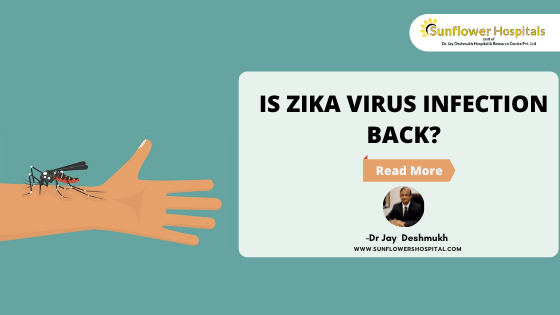Zika virus infection is again grabbing the attention of public health workers as 14 cases of Zika virus infection have been diagnosed in Kerala. The diagnosis is important as the clinical profile may mimic Dengue fever. There is no specific treatment. Prevention by avoiding mosquito bites is the only solution.at present.
What are the important symptoms of the Zika virus?
These include low-grade fever in the range of 37.8 to 38.5 degrees centigrade. Pruritic rash on the trunk, face, extremities, palms, and soles. Pain at small joints of hands and feet and nonpurulent conjunctivitis. If two or more of these features are present, then Zika virus infection seems to be a strong possibility. Other features include body ache, pain behind the eyes, and headache. Some may have abdominal pain, nausea, diarrhea. Many neurological features have been described. Encephalitis, transverse myelitis, and Guillain Rant syndrome are a few of these.
How is the diagnosis made?
In India one of the most important features would be the above symptoms and a history of recent travel to Kerala. Blood and twine are the primary diagnostic specimens. RTPCR test for Zika virus serology is an important test. Estimation of 1gM antibodies against the Zika virus is also important in diagnosis.
What are the other infections that may mimic the Zika virus?
Infections that present with fever, joint pains, skin rashes, and headache need to be excluded. These include Dengue fever, Chikungunya, parvovirus, Rubella. Some other infections like Measles, Leptospirosis, Malaria, Rickettsial infections, and streptococcal infections need to be ruled out.
How does the Zika virus enter the human body?
People are the reservoirs of the disease. Mosquitoes get the Zika virus from an infected person during the first week of their symptoms. Mosquitoes then spread the disease to others by human bites. The modes of transmission include mosquito bites, from Mother to baby, and sexual transmission. The mosquito Aedes aegypti is the mosquito responsible. This mosquito also is responsible for the transmission of Dengue and Chikungunya. Zika virus can spread from a pregnant woman to her fetus. Zika virus has been shown to cause a number of fetal brain birth defects. It is not known to pass through breastfeeding. Hence it is extremely important to prevent mosquito bites, particularly in pregnant women. Special attention should be given to prevent mosquito bites among pregnant women, women of reproductive age, and young children.
Where was the Zika virus found initially?
The virus is named after the Zika forest in Uganda and was first discovered in 1947. Outbreaks of Zika virus infection have been reported in tropical Africa, South East Asia including India.
What is the treatment for Zika virus infection?
There are no specific drugs available for this RNA virus infection. The treatment is based on symptoms and is purely symptomatic. Plenty of fluids by mouth and controlling temperature by usual medications like Paracetamol is suggested. However proper diagnosis by excluding other diseases like Dengue and Fafriparum malaria is strongly recommended. Prompt hospitalization may be required in some cases.
What is the status of vaccination against the Zika virus?
Remarkable progress has been made in this direction so far. Many studies have been conducted in animal models and phase 1 and 2 trials in humans have been completed. ZIKV has caused a significant epidemic in the Americas and some other parts of the world. It is uncertain where the next epidemic will occur. Efficacious vaccines and anti-viral drugs are the need of the hour if we face another epidemic. We only hope that the Zika virus does not spread and does not transform itself into epidemic proportions. Simply by controlling the mosquito menace and preventing mosquito bites, a lot can be achieved in this regard.
Author: Dr Jay Deshmukh
Dr Jay Deshmukh is Chief Physician and Director, Sunflower Hospital, Nagpur Honorary Physician to Honorable Governor of Maharashtra and PondicherryCentral. Dr Jay Deshmukh is an M.B.B.S., M.C.P.S., F.C.P.S., M.N.A.M.S., MD From Internal Medicine – Bombay and New Delhi.


